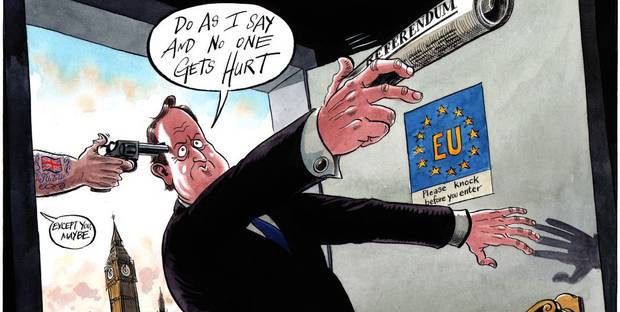Latest posts
A masterclass in creating value
What’s going on at parkrun?
Virtue-signalling all the way to the bank
Bud Light: brand purpose or virtue-signalling?
The Coddling of the American Mind, by Greg Lukianoff and Jonathan Haidt
Belonging, by Owen Eastwood
Such a simple thing
The Long Win, and The Scout Mindset
The Cult of We by Eliot Brown and Maureen Farrell
Coffee and covid modelling
By theme
Marketing strategy
Insight & metrics
Innovation & inspiration
Brand & positioning
Marketing communications
Business purpose
Leadership
By industry sector
Financial services
Retail
FMCG
Technology & start-ups
Consumer services
Business to business
Other sectors
By type
Books
Comment
Quotes
Thought leadership
Many business people are surprised and shaken by the out vote. That’s regardless of which party they supported at the last election. Labour fans are blaming Cameron for promising a referendum in the Tory manifesto, and those who voted him in for letting it happen. Pro-EU Tories are blaming him too for the naivete of that pledge, but also wondering how all those Labour voters in the midlands and north came to side with the likes of Boris and Nigel – hardly their natural bedfellows. Most shocking is that nearly all the leaders of the UK’s political parties were on the losing side.
There is one huge lesson from this vote, and it applies to marketers as much as to politicians. It’s this: how dangerous it is to cut oneself off from listening to and acknowledging how people feel. Not everyone feels the same, nor is there a “right” view. Listening may not be comfortable but it is necessary.
Most of us in the marketing business, much of it in London and the South East, don’t feel the economic pain of other parts of the country: the decline of manufacturing, the contraction of the public sector, and, especially, the loss of job prospects for them and their children. That’s not a political point, just an observation. If you lose your job in marketing, there are other jobs – imagine if most of the jobs in marketing were disappearing. We’d all want someone to blame. I suspect it had nothing to do with sovereignty for many “out” voters and much more to do with economic prospects.
Then there’s immigration, for years the topic that voters wanted to discuss and politicians refused to engage with. Remember Gordon Brown on the campaign trail in 2010. Ignoring people’s concerns, no matter how unpalatable they may be, is no way to make progress.
Voters across the political spectrum wanted out, for a variety of reasons. The trouble with the referendum is that it is a binary choice. So people with little in common find themselves on the same side. That doesn’t make them similar – it only shows they are aligned on this one reductive question.
Happily, in business we have more options. We can segment markets and offer more than one simple choice. Market segmentation is the fundamental building block of any marketing strategy, and therefore of any business strategy. It is often abused, though, as when businesses describe “product segments”, as if those are a perfect reflection of people’s wants and needs. Segmentation cannot only be about what people are currently doing and buying. Current behaviour is only a reflection of the compromised choices they are making, based on what is available to them. As with the in/out vote, there are other choices many people might have preferred, like staying in a reformed EU, or getting out while keeping the trade agreements in place. To be useful, and future-proofing, segmentation must rise above the current market offerings and assumptions. It must be about people’s wishes, priorities and feelings. That’s how we find out what they might do if given other options. It’s why good segmentation is inspiration for product and service innovation – along with customer dissatisfaction, the other great source. Politicians are largely disinterested in acknowledging dissatisfaction, preferring to try to persuade us that we are wrong, or should not be feeling that way, and need to see things the way they do. Inside business, there can be the same pressure to focus on the satisfied not the dissatisfied, and to persuade ourselves and others that everything is as good as it can be.
What we can do, as marketers, is commit ourselves not to make the same mistakes as the politicians. We cannot be representative of our entire customer base. We must keep listening, and truly listening means being open to hearing stuff we don’t like or don’t agree with, from people whose perspective is different. When people complain about poor service, or price, or whatever, ignoring them, or trying to persuade them that it’s really ok, is not a smart response. Any source of dissatisfaction is a business opportunity, for those brave enough to hear it and embrace it.
Latest posts
A masterclass in creating value
What’s going on at parkrun?
Virtue-signalling all the way to the bank
Bud Light: brand purpose or virtue-signalling?
The Coddling of the American Mind, by Greg Lukianoff and Jonathan Haidt
Belonging, by Owen Eastwood
Such a simple thing
The Long Win, and The Scout Mindset
The Cult of We by Eliot Brown and Maureen Farrell
Coffee and covid modelling
By theme
Marketing strategy
Insight & metrics
Innovation & inspiration
Brand & positioning
Marketing communications
Business purpose
Leadership
By industry sector
Financial services
Retail
FMCG
Technology & start-ups
Consumer services
Business to business
Other sectors
By type
Books
Comment
Quotes
Thought leadership
